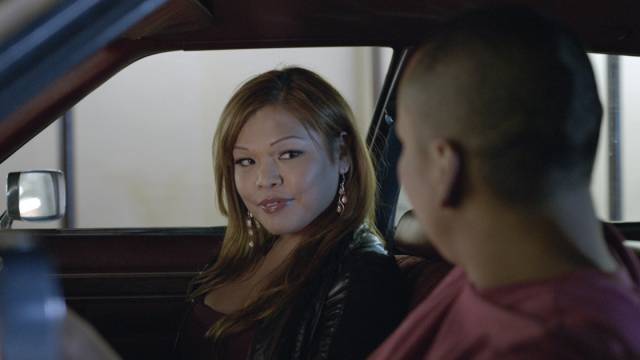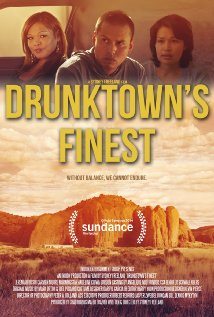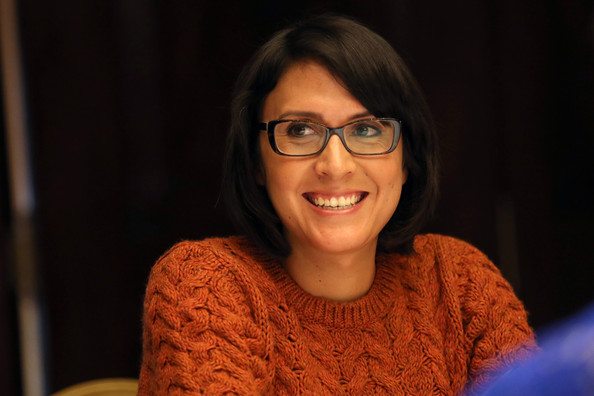

In Drunktown’s Finest, writer/director Sydney Freeland follows the lives of three young Native Americans, living in a reservation. The young Nizhoni (MorningStar Angeline) wishes to meet her biological parents against the wishes of her adoptive parents, while father-to-be SickBoy (Jeremiah Bitsui) is trying to tame his wild self in order to give his child a good example, there’s also Felixia (Carmen Moore) a transsexual who dreams of escaping the reservation and becoming famous. Combining comedy with naturalistic drama, Freeland paints a portrait of Native American life unlike anything the movies have showed us before. We had the opportunity to talk to Freeland who elaborated on casting her actors and how Hollywood tried to put her film in a box, and realized they wouldn’t be able to.
What personal qualities did the actors bring to the parts?
I think for the most part, the majority of the cast are first time actors, so I tried to cast people who would kinda play themselves. Also, once you hand the material to them they bring their own interpretation of the character. I can think of one specific example, which is Carmen, she is Navajo, she is transgendered, and she brought this depth and authenticity to the role that would’ve been hard for someone else to bring. There’s this one little moment which I love, that was essentially all Carmen, and it’s the scene where she’s with SickBoy and he goes to her house, knocks on the door and she opens the door. He’s a homophobic character and when she opens he’s like “you live here?”, and Carmen has this beautiful reaction which was “yeah, what do you want?”. Her delivery was so great because she was showing she wasn’t going to back down and she was like “yeah, motherfucker!” there’s tiny moments like that where I liked what the actors brought.
 In that scene she also makes it all about SickBoy potentially being unfaithful, and not at all about her gender, which then makes a beautiful contrast with that scene later on in which her grandfather tells her about the Navajo legend of the third gender. Navajo culture is much more accepting about transgender people, right?
In that scene she also makes it all about SickBoy potentially being unfaithful, and not at all about her gender, which then makes a beautiful contrast with that scene later on in which her grandfather tells her about the Navajo legend of the third gender. Navajo culture is much more accepting about transgender people, right?
I grew up in the reservation and I heard some of the creation stories and the tradition stories, but I wasn’t aware of their acceptance of transgender people. I left and went to film school in San Francisco and there this trans woman I met, found out that I was Navajo and said “oh wow, it must be paradise for trans people!” and I had no idea what she was talking about. But that comment led me to go and learn about my culture. On the reservation there are people who are traditional and embrace it as part of the culture, there are other people who are more conservative from a Christian perspective, but it’s definitely there, it’s part of the culture with varying degrees of acceptance.
Hollywood likes labels - this is a black movie, a white movie etc. - so whenever a person of color makes a film, they usually rely on over-explanation, to try and let white people know every single thing that’s going on. Your movie on the other side is so matter-of-fact, you don’t spend any time explaining anything, which I thought was very bold.
That actually makes me really happy, because on the surface I wanted to tell a story about people and place that I knew, but on another level below that, a lot of time specifically with Native American films, it’s always sort of “life is very simple”. You’ll see this Westerns where you’ll have Native Americans sitting around, doing nothing except waiting for Western people to come take over. You have the wise elder, the angry youths and everyone’s spitting all day. One thing that was a conscious effort of mine was that we wanted to drop the audience into a world that was already in progress and force them to catch up.
And once you have a storyteller who knows what they’re talking about, that is what makes the film universal, right?
Yeah, plus if you have this grandpa in the movie telling stories in every scene that he’s in, it dilutes the effectiveness.
The central theme of the film is summed up when one of the characters explains that the reservation is place you “leave, not live in”. I found this dichotomy between people wanting to leave and explore the world vs. them staying, quite fascinating.
That is the question, it plays into the overall idea of contrast, between beauty/ugly, contemporary/traditional, Western/non-Western. You have some people who leave the reservation and there are pros and cons to that, but it’s the same for people who stay. I was interested in exploring those ideas.
The film suggests that you have no regard for labels which I thought was pretty awesome, but when you take your movie to distributors who need a specific “market”, what were some of the things they advised?
One of the biggest comments we got was that there wasn’t a market for Native American films, but I thought “screw that” and in fact we’ve had success, people are actually paying to go and see this movie. We’ve also been to LGBT distributors and they’re like “well, it’s only a third of an LGBT film”, but I’m like “yeah, but you have a 100% LGBT director, a cast that features LGBT actors”. On one side I can’t blame them because distributors want a movie that’s marketable and I can see how this could be difficult because it falls into no box.

Which is why it’s important that independent films get out on VOD.
From a personal standpoint, the creative part of me wants to make this film available to the widest audience, because it could appeal to a lot of non-Native audiences, but selfishly a lot of our audience is Native American and they don’t have access to many things, so it’s convenient that they have access to DVD and VOD. Any exposure helps put the film out there, we mostly rely on word of mouth, so anything else that can be build upon that is awesome.
Can you talk about how important Sundance was to help you develop the film?
Sundance is an amazing organization, I wouldn’t be talking to you if they didn’t exist. People weren’t exactly throwing money at a Native American ensemble film, and I was just getting started in film, so Sundance was crucial because they felt there was potential in the script and they gave me opportunities to work on that and participate in a directors’ lab with advisors. They encourage you to sorta fail by giving you the space to try out stuff, sometimes failure is important to know what works and doesn’t. It was like night and day, who I was as a filmmaker before the Sundance labs and who came out after was a completely different person.
Drunktown's Finest is available on VOD.